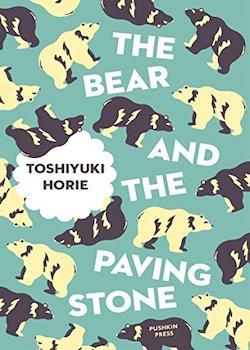The Bear and the Paving Stone

By Horie Toshiyuki
Translated by Geraint Howells
Pushkin Press, 2018
ISBN-13: 978-1782274377
Review by Harry Martin
Pushkin Press’ recent publication of novellas translated from contemporary Japanese authors has contributed some fantastically unique and original works to the English language library. The Bear and the Paving Stone (translated by Geraint Howells) is a collection of three works by award-winning author Horie Toshiyuki. The titular story, winner of the Akutagawa Prize in 2000, consumes most of the volume, with two shorter pieces supporting the main theme but nevertheless managing to impart their own unique offerings.
Horie, a renowned scholar of French literature, has contributed four titles in total to the Japanese literary scene, this being one of his more recent contributions from 2000. I have not read enough of his work to establish a comprehensive sense of his overall style; however this novella suggests a thoughtful, conscientious writer who initially beguiles with a soft, easy tone before later revealing much more solemn and profound themes.
The title story follows a Japanese writer visiting an old friend in Northern France, taking in some familiar Normandy sights such as Mont Saint-Michel and the local community in which his friend now lives. What initially seems to be an unassuming reunion between two old friends soon strays into more intense waters via discussions of literature, philosophy, and history. The second story, ‘The Sandman is Coming’, tells of a man joining a woman on an unassuming beach walk which later transpires to be on the anniversary of her brother’s (and his friend’s) passing. The third and final story, ‘In the Old Castle’, is of a slightly darker nature. Again set in France, the narrator reminisces about when he and his friend decided to break into a castle ruin, with sinister results.
Horie’s writing is superficially relaxed as all three stories initially present themselves in a far more simplistic light than the complex themes which lie beneath. Unifying the three stories is Horie’s creative emphasis on memory, where he abruptly interrupts the narrative with the resurgence of a past sensation which momentarily consumes the present with potent and powerful emotions. In The Bear and the Paving Stone the past is summoned through the characters’ conversations about a famous French lexicographer and the narrator’s friend’s photographs, which conjure up images of Nazi death camps and the effects of the Second World War on his Jewish heritage and personal identity.
In the ‘Sandman is Coming’ there is an overwhelming sense of nostalgia and loss as the narrator and deceased friend’s sister share a melancholy moment on the beach, reminiscing about the sand castles they used to build in their youth. Here Horie draws on the Japanese concept of impermanence, the bittersweet beauty of transience and how nothing is meant to last, both sandcastles and life. The narrator’s memories of his adolescence and the feelings he felt for both sister and friend remain all too relevant in the present time.
‘In the Old Castle’ begins with the narrator’s receipt of an old photograph taken ten years earlier, when he visited a friend in France. This provokes a vivid recollection of the adventure he and his friend embarked upon; breaking into an old castle ruin. Although the shortest of the three stories, this concludes the novella and manages to encapsulate the flavour of the whole volume in its closing statement; how humanity is always trying to escape the unpleasant memories that accompany us through life.
The masterful way in which Horie has managed to interweave these three short stories is in itself a motivation to seek out more of his work. The notion of the past conflicting with and influencing the present is a universal sensation that we have all experienced; reading this book might offer an opportunity to meditate on some of our own lost memories, and consider how these may have affected the decisions and paths we have chosen in life.

